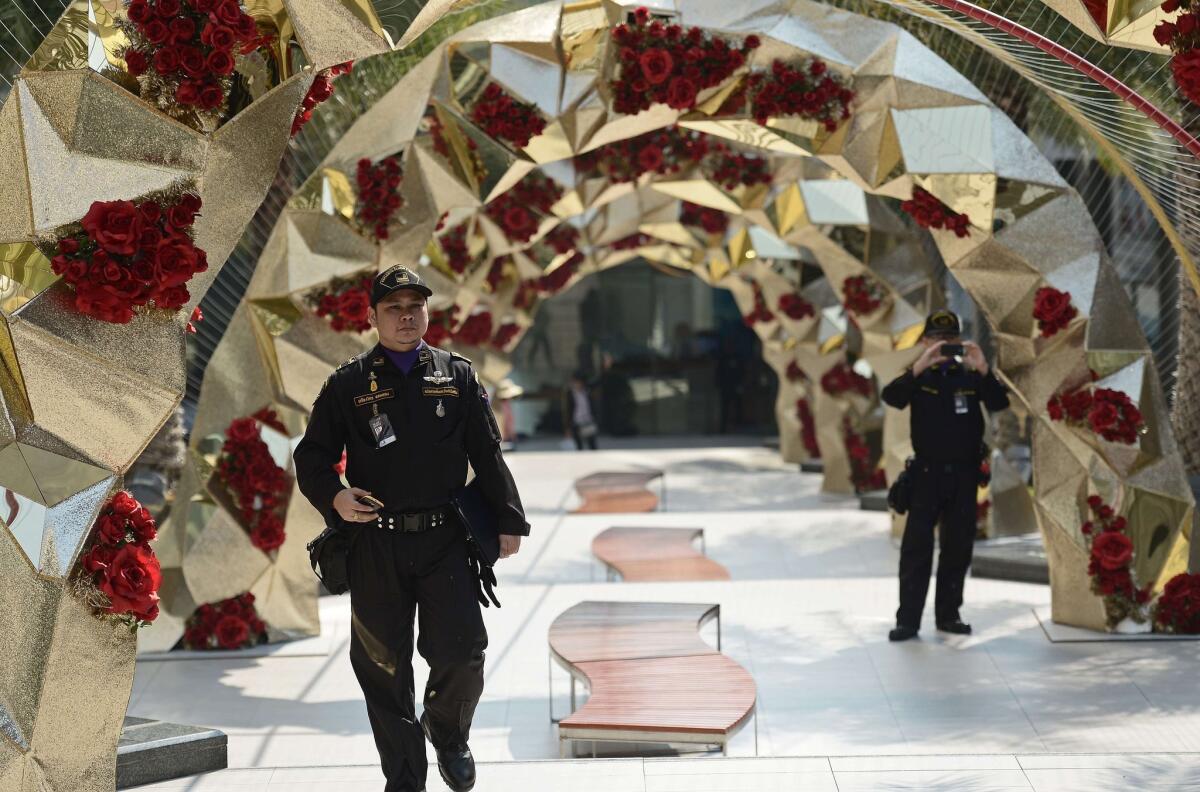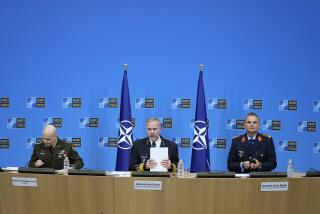U.S., Thailand to hold military exercise despite tensions

- Share via
Reporting from Bangkok, Thailand — The United States and Thailand begin major military exercises Monday that are being overshadowed by growing tension between the longtime allies over the actions of Thailand’s army-run dictatorship.
The annual exercises are the first to take place since the Thai military ousted a democratically elected government in a coup in May. Thai generals had promised a swift return to democracy, but have imposed strict restrictions on free speech and shown little willingness to reconcile with the deposed government.
After the military government decided last month to impeach the ousted prime minister, Yingluck Shinawatra, on corruption charges, Assistant U.S. Secretary of State Daniel R. Russel used a speech at Bangkok’s Chulalongkorn University to criticize the military dictatorship for “significant restraints on freedoms” and call for martial law to be lifted.
“When an elected leader is deposed, impeached by the authorities that implemented the coup, and then targeted with criminal charges while basic democratic processes and institutions are interrupted, the international community is left with the impression that these steps could be politically driven,” Russel said.
The comments prompted an angry response from Thailand’s self-appointed prime minister, Gen. Prayuth Chan-ocha, who said the United States did not understand the country’s “unique situation.”
“Thai democracy will never die, because I’m a soldier with a democratic heart,” the general said, according to news reports.
The two-week war games, involving about 13,000 troops and 24 nations from across the Asia-Pacific region, will be “significantly refocused and scaled down” in light of the coup, with fewer American troops than in previous years, said Melissa Sweeney, spokeswoman for the U.S. Embassy in Bangkok.
About 3,600 U.S. personnel will participate, down from 4,300 in 2014 and 8,400 in 2013, Sweeney said. The focus will be on humanitarian assistance and disaster relief instead of training for lethal operations, officials said.
After the May coup, the State Department suspended $4.7 million in direct military assistance to Thailand as required by law and canceled some visits by Thai military officers to the United States. But any suggestion that the U.S. would suspend the military exercises, which have taken place for about 30 years, was dispelled in October when the U.S. Embassy confirmed that they would go ahead.
“Thailand is a valued friend and ally,” Sweeney said in an interview. “The Thai government is very aware of our position on the coup.”
The U.S. military relationship with Thailand spans two centuries and is one of the United States’ most durable non-NATO partnerships. The exercises, known as Cobra Gold, also involve South Korea, Japan, Indonesia and Singapore, and are regarded as an important part of U.S. diplomacy in the region.
The decision to continue with the exercises is also a reflection, analysts say, of a U.S. desire to counter a growing push by China to build security and economic ties with Thailand. The Obama administration has launched a renewed strategic push in Asia by announcing new arms sales and military cooperation with India and other countries, a move aimed largely at checking China’s rise.
China will participate this year for the first time, after being invited to observe for several years.
China’s defense minister recently visited Bangkok to complete a deal between the nations to increase intelligence sharing and cooperation against transnational crime. Beijing has also supplied Thailand with loans and grants to build infrastructure since the coup.
Though China is unlikely to supplant the United States as Thailand’s chief military supplier, Thai leaders have emphasized that Beijing places no political conditions on its military aid.
“China will not intervene in Thailand’s politics but will give political support and help maintain relationships at all levels,” Gen. Prawit Wongsuwan, Thailand’s defense minister, told reporters.
“It seems to me that the Obama administration is more worried about allowing China to establish closer military ties with Thailand if indeed the U.S. refuses to participate in Cobra Gold with Bangkok,” said Paul Chambers, a professor at the Institute of South East Asian Affairs in the northern Thai city of Chiang Mai.
Thai generals have banned political gatherings and said that new elections might not take place until 2016, but otherwise they have sought to run what some call the world’s “smiliest” military dictatorship.
Prayuth has ordered “happiness campaigns” around Bangkok, complete with petting zoos and young women clad in scanty fatigues.
But he also raised eyebrows with some erratic comments. He was forced to apologize for making a joke about rape soon after the bodies of a young British couple turned up on a beach in southern Thailand; the woman was reportedly raped before she was killed.
Several weeks later at a news conference, Prayuth, who has had a tense relationship with news media, stroked the head of a journalist and scratched him behind the ears, as if he were petting a dog.
Special correspondent Paluch reported from Bangkok and Times staff writer Bengali from Mumbai, India. Staff writer W. J. Hennigan in Washington, D.C., contributed to this report.
For more news from South Asia, follow @SBengali on Twitter
More to Read
Sign up for Essential California
The most important California stories and recommendations in your inbox every morning.
You may occasionally receive promotional content from the Los Angeles Times.











